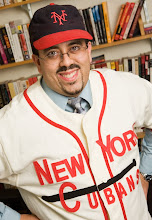Prior to the game, the White Sox organized a forum which consisted of three panels and was moderated by ESPN's Michael Smith. The panel on which I participated, the first of the three, focused on the legacy of the Negro Leagues and included Sharon Robinson (daughter of Jackie Robinson) along with fellow Negro League historians Eddie Bedford and Larry Lester. My participation on the panel was to account for the history of Latinos in the Negro Leagues, and to offer the perspective of significance of the Negro League for Latinos.
When I got home, I had an email (below) in my in-b0x that was sent immediately following the event. I have not joined the Blackberry generation (although my Dad has one--how weird is that?), so I did not see the email until arriving home late that evening. However, I wanted to share my response to the e-mailed query since it speaks to what precisely I hope my work as a scholar speaks.
--------------
7/7/08
Dear Prof. Burgos Jr.:
Shouldn't the record be corrected to reclassify Minoso as NOT being the first black player on the Chicago Whites Sox?
Dear Sir:
I entirely disagree that the record is inaccurate in naming (and honoring) Minnie Minoso as the first black player on the White Sox as a historian who studies the period of integration in baseball and as a scholar who studies race in the Americas (the U.S. and Latin America). He was indeed the first black player on the Sox, and that is exactly how the Chicago Defender, Chicago Tribune, and all the other papers in
Minoso underwent two levels of acculturation in coming to the
To state otherwise is to deny the history of Minoso being the subject of racial animus on and off the field--the insults hurled at him from opponents of integration, the pitches thrown at him from opposing teams, the separate accommodations he had to endure when traveling through the American League circuit. Opposing teams and segregation sympathizers did not give him a pass because he was Cuban, they saw a black (Cuban) man before them and made their feelings known.
Indeed, it would be historically disingenuous to strip Minoso of this recognition. This is a man whose major league aspirations were placed on hold due to Jim Crow policies and racial thinking of individuals inside
In fact, I have argued that too many deny what black Latinos went through in recalling and/or writing about this era in baseball and American history. For in addition to racial slights, they also endured the cultural chauvinism of white and black Americans for their being Latino. This made their successes on the field all the more greater.
Minoso is a standard bearer for this history, his personal grace and dignity in the midst of this adversity makes his baseball excellence ("stats") all the more compelling. In this regard, he is quite like Jackie Robinson and Larry Doby, their statistics do not convey their historical importance nor their achievements. All three ought to be honored with plaques in Cooperstown. Yet, it is Minoso who has been denied that rightful place in history precisely because so many deny the significance of his blackness and how race so affected the journey and triumph of black Latinos who part of the generation of integration pioneers.
In the end, ironically enough, Minoso was not the first Latino to play for the White Sox, but he WAS most definitely the first black man who took on the awesome challenge of integrating the Sox and enduring the racial animosities of the era. The path that Minoso and other black Latinos (or Afro-Latinos) was indeed different than that which Rafael Almeida, Armando Marsans, Adolfo Luque, Miguel Angel Gonzalez, and other Latinos permitted to perform in the Major Leagues before Jackie Robinson and the official start of baseball's racial integration. To alter the record of how racial understandings affected Latinos as they were assigned to different locations along the color line is to deny how much race matters then as now.






4 comments:
Very well said, Adrian. What are your thoughts on Ozzie Virgil and the Tigers? The 50th anniversary of his debut in Detroit was recently acknowledged. On this question, I'm in agreement with Bill Dow freelance to the Detroit Free Press, rather than Lynn Henning of the Detroit News.
http://www.freep.com/apps/pbcs.dll/article?AID=/20080617/SPORTS02/806170388/1050
http://www.detnews.com/apps/pbcs.dll/article?AID=/20080617/SPORTS0104/806170362/1416/METRO07
As you know, he was originally signed for Giants by Alex Pompez.
Rod Nelson
Adrian:
Great blog. welcome to the 21st century.
Great share.. Thank you
Post a Comment